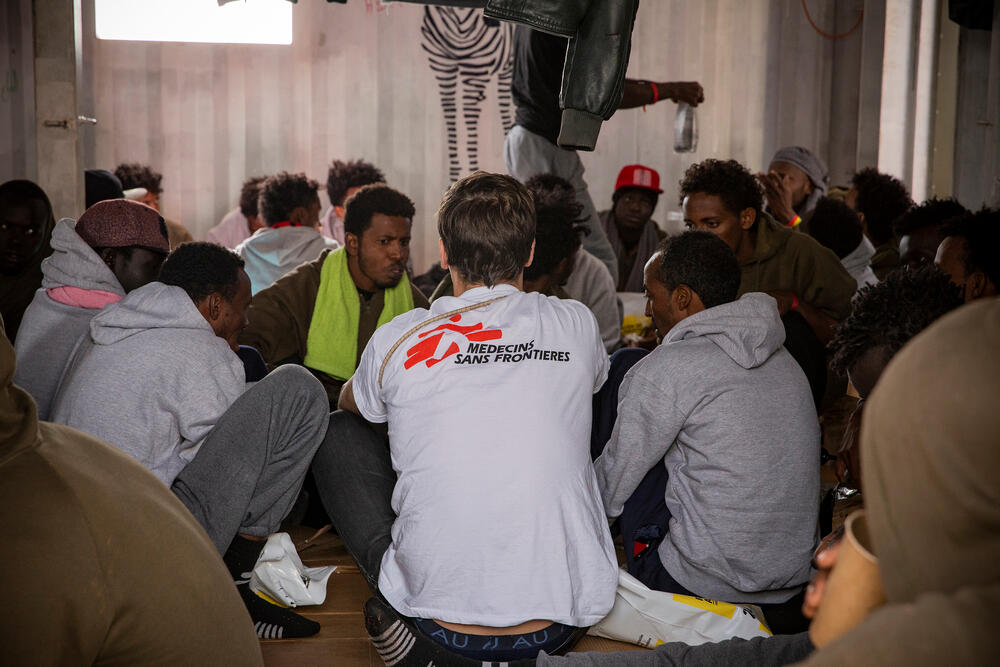Humanitarian affairs officer
*THIS ROLE IS CLOSED UNTIL FURTHER NOTICE*
Working as a humanitarian affairs officer (HAO) with us can be tough but hugely rewarding.
HAOs help Médecins Sans Frontières/Doctors Without Borders (MSF) to expose the impact that conflict and neglect have on the people we serve and to advocate for them. They also ensure we maintain access to our patients. From carefully building a sensitive advocacy strategy to writing reports on the exclusion of certain communities from medical care, the role of an HAO is incredibly varied.
Responsibilities
Our HAOs are usually based in the capital city with frequent travel to our projects and are responsible for gathering information from all actors involved in the situation they are working in.
They then use this to strategically advise on how MSF operates and communicates in situations that jeopardise our access to patients, our voice and our principles.
Bearing witness
The primary job of an HAO is using the ‘witnessing’ component of MSF’s work to advocate for MSF and the people it serves, documenting disasters and conflicts without bias in order to bring the plight of their victims into the public eye.
This can include beneficiaries, other INGOs, UN agencies, MSF staff and parties to the conflict.
Unbiased reporting
The information they gather is then collated, analysed and used to draw up unbiased reports on a wide variety of issues.
These could include: the efficacy of the response of humanitarian actors to a crisis, speaking out about war crimes committed against civilians by armed actors or collecting testimonies from women who have experienced sexual violence due to poor security in displacement camps.
An HAO will be responsible for some or all of the following:
- Participate in the definition and targeting of advocacy messages to raise awareness of medical-humanitarian issues at local/national levels, such as:
- Violence, displacement and protection issues.
- Availability, access, quality of medical assistance
- Principled humanitarian action
- Prepare analysis and advocacy written material for internal and external use (briefings, letters, position papers)
- Develop and maintain relationships with local authorities (state-based and traditional) and communities, UN agencies, and other humanitarian actors and international stakeholders to promote MSF priorities and concerns
- Establish working relationships with relevant local and regional non-state actors, think tanks, academic institutions, human rights organizations to coordinate and time initiatives
- Collaborate with project coordinators, the medical coordinator, and the Head of Mission to support the development of coherent operational strategies addressing the medical-humanitarian situation
- Perform targeted research and provides data analysis concerning the local context to support projects and inform medical-operational programmatic orientations
- Undertake stakeholders’ analysis (power, resources, and key actors) seeking to provide a better understanding of local dynamics to increase acceptance and improve operational and advocacy responses to populations in need
- Monitor and compile regular updates on humanitarian aid system dynamics (NGO/Donor planning) and interactions with local authorities (both state-based and traditional) to increase the local impact of MSF lobbying in line with its operational plans, regular activities and overall medical-humanitarian advocacy objectives
- Review data collection system already in place at project and mission level
- If needed, design and implement data collection systems with regards to medical and humanitarian issues in order to provide reliable information for the development of both operational and advocacy strategies
- Where appropriate, support the medical coordinator with adding a humanitarian affairs/advocacy angle to the design of operational research.
- Lead discussions, trainings, briefings, etc. about MSF principles, international humanitarian law, medical ethics, and advocacy at project level to raise awareness of MSF national and expatriate staff on these topics
Role requirements
Academic background to Master level in one of the following fields: anthropology/social/political sciences, law, gender studies, protection
- Essential degree in Law, Humanitarian affairs, Political Sciences, or related university degree
- Essential previous working experience in humanitarian contexts (including conflict, disaster, or resource-poor environments) at least two years in research, analysis and advocacy.
- Essential experience with MSF or other NGOs working in a low-income country (Minimum one year)
- Excellent analytical skills with the ability to synthesise complex information and identify key issues, concerns or trends.
- In-depth understanding of current humanitarian debates, actors, and systems, and of the dilemmas and tensions characterising modern humanitarian interventions.
- Proficiency in both English and one of the following languages: French, Arabic or Spanish;
- Excellent writing skills with proven track record to draft clear, concise documentation on sensitive or complex topics.
- Ability to work independently and negotiate difficult situations with diplomacy and tact.
- Ability to cope with stress and to coordinate/prioritise your workload under tight deadlines.
- 12 months availability
Strong Assets
- Policy, advocacy and/or campaigning experience.
- Experience working with humanitarian protection issues or refugee/migrant case management.
- Experience in networking and establishing relationships.
- Experience in training and/or convening workshops on human rights, humanitarian law and/or humanitarian principles.
- Specialized expertise such as gender, protection, SGBV, or specific country expertise in humanitarian contexts.
- Digital literacy (database design/analysis, MS package, and internet-based research).
Languages
We're currently looking for humanitarian affairs officers with good French, Spanish or Arabic skills.
Your language level may be tested during the recruitment process.
*MSF Ireland can only accept applications for field positions from Irish residents who have a valid permit to work in Ireland. If you do not have this we cannot accept your application.
Before you apply
Make sure you read our application process guide for an overview of what to expect when you apply for an overseas role.
We take your safety, security and wellbeing seriously. Please watch these videos before you decide whether or not to apply for this job.
Apply to be a humanitarian affairs officer
Please only apply if you meet all of the requirements below.
1/7
2/7
3/7
4/7
5/7
6/7
7/7

